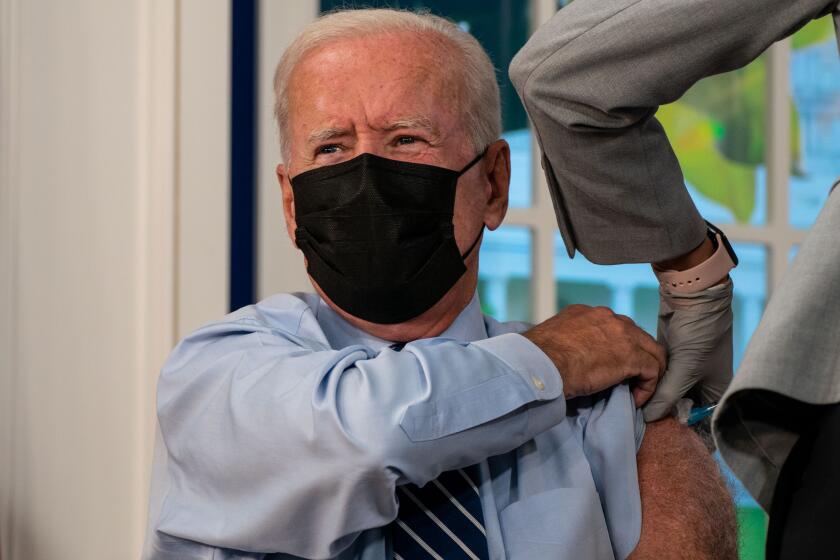Column: Rescinding the military’s COVID vaccine rule is the Democrats’ dumbest compromise in the lame-duck session

- Share via
If you need evidence that Congress is dominated by its stupidest members, look no further than the apparent agreement in the House to lift the requirement that members of the military be vaccinated against COVID-19.
Congressional sources say that rescinding the mandate, which Defense Secretary Lloyd Austin imposed in August 2021, is part of a compromise aimed at passing this year’s $858-billion National Defense Authorization Act during the current lame-duck legislative session.
The House is expected to vote on the act Thursday, with the Senate to follow. The Democratic capitulation to the GOP’s demand to rescind the vaccine mandate is an inexcusable dereliction of Congress’ duty to care for the health of military service members and the general public.
We lost a million people to this virus...So this mandate has kept people healthy.
— Defense Secretary Lloyd Austin
Lifting the COVID vaccine mandate has been a Republican hobby horse since its inception. The GOP position reflects the consistent anti-science coloration of the party’s policy stances, especially where anti-pandemic measures are concerned.
Austin and President Biden have fought back against congressional efforts to rescind the mandate. As recently as Saturday, Austin told reporters that he wanted to keep the mandate in place.
Get the latest from Michael Hiltzik
Commentary on economics and more from a Pulitzer Prize winner.
You may occasionally receive promotional content from the Los Angeles Times.
“We lost a million people to this virus,” Austin said. “A million people died in the United States of America. We lost hundreds in DOD [Department of Defense]. So this mandate has kept people healthy.”
On the other side are Republicans infused with anti-vaccine myth-making.
These include untrue claims that the vaccines manufactured by Moderna and Pfizer are not safe or effective and haven’t been adequately tested — claims that have been consistently refuted by the Centers for Disease Control and Prevention.
The caliber of the vaccine objections can be gleaned from the lawsuit brought in Colorado federal court by two former military officers in 2021.
They based their objections on a passel of long-debunked anti-vaccine claims, including that the vaccines were “experimental,” that the Pfizer shot had never actually been approved by the Food and Drug Administration and that the shots were a “deadly... genetic modification injection.”
A federal judge in Denver dismissed the lawsuit in January, but the plaintiffs appealed. At a hearing last month, a panel of federal appellate judges displayed frank skepticism about their claims. The panel hasn’t yet ruled.
The anti-vaccination movement grew stronger during the COVID pandemic. The result is a surge in measles and other preventable diseases.
The partisan attacks on COVID vaccination have undoubtedly contributed to the increasing gap between Republican- and Democratic-leaning Americans in COVID death rates and vaccination rates.
A recently published study from the Yale School of Medicine found that “excess deaths during the pandemic were 76% higher among Republicans than Democrats” in Ohio and Florida. The partisan discrepancy in death rates “increased significantly after vaccines were introduced.”
A survey published in November 2021 by the Kaiser Family Foundation found that Republicans and Republican-leaning independent voters made up 60% of the adult unvaccinated population, despite representing only 41% of adults; Democrats and Democratic-leaning independents accounted for only 17% of the unvaccinated.
“Political partisanship is a stronger predictor of whether someone is vaccinated than any demographic factor,” the survey reported.
Republicans on Capitol Hill have tried to cast the COVID vaccine mandate as a drag on military readiness. In a Nov. 30 letter to Republican Senate leaders, 13 GOP senators led by right-winger Rand Paul of Kentucky noted that 3,400 troops had been discharged by April for refusing the vaccine.
The mandate “adversely affects our service members and our national security,” they wrote. “The United States simply cannot afford to discharge our brave men and women in uniform and lose the investments we have made into each and every one of them due to an inept bureaucratic policy.”
What was “inept” about the mandate they didn’t say.
It should be obvious that refusing the vaccine ordered by senior Pentagon officials to maintain the health of the armed services would be a clear act of insubordination; allowing those actions to stand would undermine readiness far more than discharging the objectors.
Florida’s study advising young men to avoid the COVID vaccines is hopelessly unscientific.
The Pentagon said in April that about 70% of the 3,400 troops separated from the service for vaccine refusal received general discharges, which would allow them to keep their veterans benefits and return to service if they received the vaccine.
The Pentagon also said that there were “no operational impacts across the force for readiness” resulting from the mandate. About 97% of active-duty troops and officers were vaccinated by mid-April.
Austin, Biden and the Democrats in the House have stood firm against Republican demands that service members who refused the vaccine be reinstated.
In a Dec. 4 appearance on Fox News, House Minority Leader Kevin McCarthy (R-Bakersfield), said that rescinding the mandate was a nonnegotiable demand for the GOP’s assent to the National Defense Authorization Act — “otherwise, the bill will not move.”
The Democrats should have called their bluff and upheld its own healthcare policy. Giving in to pressure to rescind the COVID vaccine mandate could even undermine the Pentagon’s other vaccine mandates for service members, which include shots for polio, measles, hepatitis, flu and tetanus.
Is it really plausible that the Republicans would have torpedoed the act over this issue? Defense spending is almost the only federal spending that the GOP favors; here’s betting that the party wouldn’t be comfortable with having the funding act’s failure being hung around its neck.
More to Read
Get the latest from Michael Hiltzik
Commentary on economics and more from a Pulitzer Prize winner.
You may occasionally receive promotional content from the Los Angeles Times.













